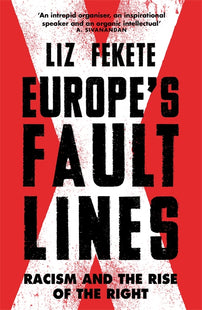The Struggle for Permanence: The Occupation of Universities by Migrants and Students in France
The claims now being made on universities and public institutions in France provides an opening onto different kinds of critical solidarity and strategy.

One of the most difficult aspects of the humanitarian discourse around migration is its facile sensitivity. Those who are struggling for permanence — for housing, for a secure mobility, for papers, for the right, firstly but not simply, to reproduce themselves — are up against a politics defined by race and motivated by a mix of defensive fear and pseudo-compassion. This results in a lip-service to "support" that is as arbitrary as the weather, which admits that people who are forced to fend for themselves on the street might need shelter when it’s snowing, but which withdraws at the first signs of a blue sky. Despite the fact that the violence of the structural response to the mass movement of people within and without Europe (that has been increasingly visible since 2014) appears to show a mounting consistency, the experience of this migration remains defined by a confrontation with a power whose violence lies in its arbitrariness. One reason for this is that the "crisis" is not in truth quantitative but qualitative, not about unseen numbers of migrants coming to Europe but about the fact they have not been asked to come by the labour market and its executives. Yet while states are rapidly developing new technologies of control and security, they appear fixed on the idea that the situation and those who embody it can be silenced. Thus they contain migrants in camps or scatter them around the streets of Europe, whilst investing money in deportation and "pre-emptive" measures to stop people leaving their damaged countries in the first place. In the face of this state-sanctioned identitarian violence and the empty benevolence that gives it expression, a concrete argument is being made through the occupation of the copious space that there actually is.
Recently in France, there have been a number of occupations of university buildings by migrants and those who are organizing in solidarity with them. In Grenoble, Lyon, Nantes, and, since Tuesday 30th January, at the University Paris-8 Saint-Denis, spaces are being forced open that provide shelter and render visible the continued possibility of an organized response. There is nothing exceptional about occupying spaces, which has been a matter of daily necessity for all those migrating to and within Europe in recent years. But perhaps the claim that is right now being made on university life and the public institution more generally provides an opening onto different kinds of critical solidarity and strategy. The history of Paris-8 gives it a symbolic value to this struggle. Set up in the wake of May ‘68, it was intended to provide a radical alternative to existing higher education institutions, not simply in terms of what was taught, but, equally, who. Workers, militants, migrants, were privileged in this regard. And still today, it remains a university with a high proportion of students with precarious immigration statuses, and the highest proportion of non-French students in France.
The first couple of weeks of the occupation have been characterized by a struggle over communication. The occupants have sent out almost daily communiqués to gather support, from within and without the university, negotiated with different faculties over the use of the classrooms that are now in occupation, intervened in meetings to raise awareness, and served food outside the library. This work seems to be taking effect, within a community that is broadly supportive, and at least the short-term security of the occupation seems all but won. That is a real victory, after the university, in a rare measure, introduced student card, identification, and/or bag checks at the entrance from day-one. Moreover, it became clear that the presidency was silencing the positive messages about the occupation and publicizing only those that were more or less critical of a perceived refusal to negotiate over the use of rooms. A pertinent aspect of the institutional dynamics has been the way management sought to embed a division between the student and migrant occupants. The committee that has been organizing most of the support is, however, hardly dominated by students (and many of the students who are organizing are not from Paris-8). But more important, and problematic, is the tacit assumption that it is only the students who have a political agenda over which they are prone not to give ground, while the migrants, it follows, merely need shelter.
This is a reactionary response to the problem of hierarchy and privilege between migrants and those who are in practical solidarity with them, which contains a defeatist analysis of political practise itself. For it insinuates that resistance is nothing but an inevitable form which will always reproduce itself irrespective of what is being fought against. But to strip politics of its historical particularities effectively implies that it has no chance of making a dent on that history, creating the ground for a nihilist concession to an interminable reproduction of the same. It ought to be from the perspective of the social movement of 2016 against La Loi Travail, which brought together school-kids, students, and unionists; or equally from that of the new French immigration act (Loi D’Asile et Immigration) that will come into effect this month that an analysis of how and why students are agitating should begin. Another important context in this regard is the reform to higher education and schooling (Loi Vidal) which is being pushed through right now and against which is growing a new wave of strikes and occupations. In the name of making French universities more "competitive," the reform introduces selection to French universities, and will deepen a stratified system in which already overfunded centres of "excellence" will attract more finance and an ever more exclusionary demographic base. The implications for the universities left behind, and their students, who are so often working-class, and BME, migrants, are dire. Linking the occupations of those who are still fighting for legal visibility with the movement against this higher education reform is one way that it might grow in strength and number.
But the other side of this response is much more insidious. Doubtless, an acceptance that migrants are people "too" who deserve at least a minimum of respect and dignity is better than nothing in a context of intensifying identitarianism. And giving support wherever it can be given is of course more than necessary. Nevertheless, a merely humanitarian discourse and practise remains bound to the very structures it claims to be fighting against. Implying that migrants are just receptacles for the care of the privileged does nothing to confront the structures of racism and global inequalities that have produced this situation in the first place. Rather, by infantilizing migrants as "victims" it reproduces a dynamic that is constitutive of those very structures. And here the liberal affirmation that migrants just need our help begins to dovetail with a right wing demonization that sees any moment in which migrants resist what they are up against in Europe as some kind of gross betrayal of bourgeois order and hospitality.
Solidarity is about affirming and supporting one another as subjects with particular voices and demands, and undoing paternalism. It is about forms of care that push back against the neo-colonial economy of debt and guilt. But equally, it must not assume that the acquired disdain for management and authority by lefty students is any more or less rigid and determined than that of those whose encounter with European authority has been one almost exclusively defined by racist bureaucracy and police violence. Activism is not the reserve of those who have the privilege to strategize over it, and nor does solidarity move unilaterally from one homogeneous group to another. Many of the migrant occupants of Paris-8 have very different immigration statuses, different languages, cultures, ages, ethnicities, and religions. There too are the possibilities of lifting particular demands out of their isolation, and into a shared voice against an immigration politics whose apparent arbitrariness will never hide its concerted racism, being worked through.
The balance of power remains, however, opaque. The whole architecture of immigration policy is designed to defer responsibility. From barely comprehensible paperwork to the 2004 Le Touquet agreement between France and the UK, which pushes the UK border back to Calais, and up to the Dublin Regulations, which bind the responsibility for processing asylum claims to particular states, based on a ruthless regime of (often torturously) enforced fingerprinting. So many people who currently have no access to legal support, housing, and papers, are those who had their fingerprints taken in Italy or Greece and therefore risk deportation back to southern Europe if they register themselves for support further along their journeys. The cynicism of this policy, its barely veiled intention to push migrants back to the peripheries of Europe in the hope they might one day disappear from the western gaze, coupled with the obstacles it puts in the way of essential material support, epitomizes everything the occupation is fighting against. And yet a preview of the imminent Loi D’Asile et Immigration, forecast for 21st February, shows new "special measures" for forcing people back to their first point of entry in Europe. The need to occupy space and build forms of permanence in the face of this migration policy and the xenophobia it legitimizes is becoming increasingly important.
The occupants of Paris-8 have stated, since their first communiqué, that they will not leave the university until they have papers, housing, an end to the Dublin Regulations, and end to deportation, and the end to the mistreatment of minors. These are political demands that obviously exceed the remit of the vice-president. And yet accumulatively public, material, and concerted support is the only way to begin to make inroads on a centre of power which otherwise risks never showing its face. Liberal institutions have rightfully been discussing, in recent years, the decolonization of curricula. It would be better to start with the decolonization of the institution itself. Racism in higher education is only partially addressed by changing syllabi and developing new theoretical perspectives. For it is more a question of who has access to this education in the first place, and who is instead employed to service the university, to keep it clean, to cater for it, to maintain it at all. That burden falls almost invariably on a racialized workforce whose precarious contracts are designed to capitalize on vulnerable immigration statuses. The relationship between this embedded system of exploitation and the abuses within the asylum system that are not new but perhaps newly visible is intimate and the occupations that are currently going on French universities are showing ways to resist this.
All of the practical work that is being done in this occupation, from organizing food and hygiene, to legal work and translation, depends upon the funding and support of those who are committed to its refusal of the existing European immigration regime. For those in France, there is a regularly published list of daily needs here, and for those who are further afield, there is a crowd funder that has just been launched. Please support and raise public awareness in any way you can!
[book-strip index="1" style="display"]




